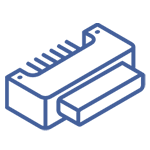

WAGO 704-5044
Manufacturer No:
704-5044
Tiny WHSLManufacturer:
Utmel No:
2685-704-5044
Package:
-
Description:
Wago DIN Rail Interface Modules
Quantity:
Unit Price: $1,105.584093
Ext Price: $1,105.58
Delivery:





Payment:











In Stock : 720
Minimum: 1 Multiples: 1
Qty
Unit Price
Ext Price
1
$1,105.584093
$1,105.58
10
$1,069.230264
$10,692.30
25
$1,061.797680
$26,544.94
50
$1,054.416763
$52,720.84
100
$1,032.729445
$103,272.94
500
$958.894563
$479,447.28
Want a lower wholesale price? Please send RFQ, we will respond immediately.
RFQ Now
Add to RFQ list
You may place an order without registering to Utmel.
We strongly suggest you sign in before purchasing as you can track your order in real time.
For your convenience, we accept multiple payment methods in USD, including PayPal, Credit Card, and wire transfer.
RFQ (Request for Quotations)It is recommended to request for quotations to get the latest prices and inventories about the part.
Our sales will reply to your request by email within 24 hours.
1. You'll receive an order information email in your inbox. (Please remember to check the spam folder if you didn't hear from us).
2. Since inventories and prices may fluctuate to some extent, the sales manager is going to reconfirm the order and let you know if there are any updates.
- TypeParameter
- Mounting Type
The "Mounting Type" in electronic components refers to the method used to attach or connect a component to a circuit board or other substrate, such as through-hole, surface-mount, or panel mount.
DIN Rail - Manufacturer Part Number7045044
- ManufacturerWago
- PackageBox
- MfrWAGO Corporation
- Product StatusActive
- Voltage Rated
RATED voltage is the voltage on the nameplate - the "design point" for maximum power throughput and safe thermal operation.
24VDC - Operating Temperature
The operating temperature is the range of ambient temperature within which a power supply, or any other electrical equipment, operate in. This ranges from a minimum operating temperature, to a peak or maximum operating temperature, outside which, the power supply may fail.
-25°C ~ 40°C - Series
In electronic components, the "Series" refers to a group of products that share similar characteristics, designs, or functionalities, often produced by the same manufacturer. These components within a series typically have common specifications but may vary in terms of voltage, power, or packaging to meet different application needs. The series name helps identify and differentiate between various product lines within a manufacturer's catalog.
- - Wire Gauge
a measurement of?wire?diameter.?This determines the amount of electric current the wire can safely carry, as well as its electrical resistance and weight.
12-28 AWG - Current
In electronic components, "Current" refers to the flow of electric charge through a conductor or semiconductor material. It is measured in amperes (A) and represents the rate at which electric charge is moving past a specific point in a circuit. Current is a crucial parameter in electronics as it determines the amount of power being consumed or delivered by a component. Understanding and controlling current is essential for designing and operating electronic circuits efficiently and safely. In summary, current is a fundamental electrical quantity that plays a key role in the functionality and performance of electronic components.
5 A - Coil Voltage
Coil voltage refers to the electrical potential difference that is applied across the coil of an electromechanical device, such as a relay or a solenoid. This voltage is essential for energizing the coil, creating a magnetic field that enables the device to perform its intended function, such as opening or closing contacts. The coil voltage is specified by the manufacturer and varies depending on the design and application of the component, commonly available in standard values like 5V, 12V, 24V, and others. Proper selection of coil voltage is crucial for optimal performance and longevity of the device.
24 VDC - Process Side Connection
Process Side Connection refers to the method by which an electronic component is connected to the manufacturing or assembly process during production. This parameter specifies how the component is physically attached or integrated into the overall system or circuit. The process side connection can include various techniques such as soldering, surface mounting, wire bonding, or other methods depending on the type of component and the requirements of the manufacturing process. It is an important consideration in ensuring the reliability and performance of the electronic component within the final product.
Terminal Blocks - Screw Connection - Control Side Connection
Control Side Connection refers to the interface or terminal used to control the operation of electronic components or systems. It typically involves the signaling or control lines that activate, modify, or monitor the performance of a device, such as transistors, relays, or integrated circuits. This connection is crucial for the responsiveness and functionality of electronic applications, allowing for integration with control circuitry or microcontrollers.
Rectangular, Male - DIN 41651 - Positions / Poles
In electronic components, the term "Positions / Poles" typically refers to the number of connection points or terminals available on a component for electrical connections. For example, a switch with two positions may have an on and off position, while a rotary switch with four poles may have four different connection points that can be selected by rotating the switch.The number of positions or poles in a component is important because it determines the range of possible connections and functions that the component can perform. Components with more positions or poles offer greater flexibility and functionality in electronic circuits, allowing for more complex switching or routing capabilities.When selecting electronic components, it is important to consider the number of positions or poles required for your specific application to ensure compatibility and proper functionality within your circuit design.
20 - Control Side Cable Retainer
The "Control Side Cable Retainer" is a component used in electronic devices to secure and organize cables on the control side of a system. It is designed to hold cables in place and prevent them from becoming tangled or disconnected during operation. This retainer helps maintain a neat and organized appearance within the device, as well as ensuring that cables are properly routed to their respective connections. By using a control side cable retainer, manufacturers can improve the overall reliability and functionality of the electronic system by reducing the risk of cable damage or interference.
Latches - Features
In the context of electronic components, the term "Features" typically refers to the specific characteristics or functionalities that a particular component offers. These features can vary depending on the type of component and its intended use. For example, a microcontroller may have features such as built-in memory, analog-to-digital converters, and communication interfaces like UART or SPI.When evaluating electronic components, understanding their features is crucial in determining whether they meet the requirements of a particular project or application. Engineers and designers often look at features such as operating voltage, speed, power consumption, and communication protocols to ensure compatibility and optimal performance.In summary, the "Features" parameter in electronic components describes the unique attributes and capabilities that differentiate one component from another, helping users make informed decisions when selecting components for their electronic designs.
Label Holder, LED, Relays - Current Rating (Per Contact)
The parameter "Current Rating (Per Contact)" in electronic components refers to the maximum amount of electrical current that a single contact within the component can safely carry without causing damage or failure. This rating is typically specified in amperes (A) and is crucial for ensuring the reliable operation of the component within its intended application. Exceeding the current rating can lead to overheating, melting of contacts, or even electrical arcing, which can result in component failure or pose safety risks. It is important to carefully consider the current rating when designing or selecting electronic components to ensure they can handle the expected electrical loads without issues.
5 A - Contacts
In electronic components, the parameter "Contacts" refers to the physical points of connection on a device where electrical signals are transmitted or received. Contacts are typically metal components that come into direct contact with other conductive materials to establish an electrical connection. The quality of contacts, including their material, design, and cleanliness, can significantly impact the performance and reliability of the electronic component. Proper maintenance and care of contacts are essential to ensure optimal electrical conductivity and prevent issues such as signal loss, interference, or malfunction.
SPDT - Width4.370 (111.00mm)
- Length-











